Custom Anti-fingerprint glass Service
High-quality custom anti-fingerprint glass parts supplier at competitive prices.
Contact us now to request a quick quote or get a sample service.
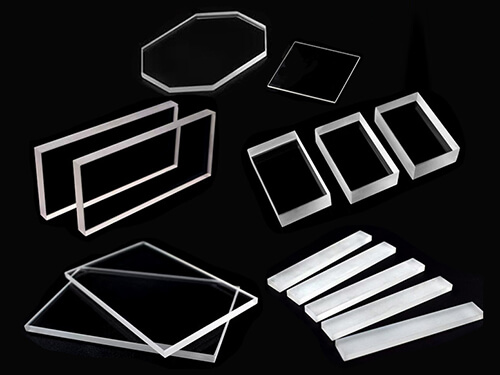
What is Anti-fingerprint glass?
Anti-fingerprint glass is a type of tempered glass that has been treated with a special coating to reduce the visibility of fingerprints and smudges on the surface of the glass. This type of glass is commonly used in applications where the glass is likely to be touched frequently, such as smartphones, tablets, and other touchscreen devices.
The anti-fingerprint coating is typically made of a thin layer of a hydrophobic material, such as a silicone polymer or a fluoropolymer. This material creates a surface that repels oil and other types of contaminants, making it more difficult for fingerprints and smudges to adhere to the glass. This reduces the need for frequent cleaning and improves the appearance of the glass over time.
Anti-fingerprint glass can be used in a variety of applications, including consumer electronics, automotive displays, and medical equipment. In addition to reducing the visibility of fingerprints and smudges, anti-fingerprint glass can also improve the durability and scratch resistance of the glass, making it more resistant to damage over time.
What are the properties of Anti-fingerprint glass?
Anti-smudge
The hydrophobic coating on the glass helps to repel oil and other types of contaminants, reducing the visibility of smudges and making the glass easier to clean.
Scratch-resistant
Anti-fingerprint glass is typically tempered or otherwise strengthened to improve its durability and scratch resistance.
Improved optical clarity
The anti-fingerprint coating can improve the clarity and brightness of the glass, reducing reflections and glare that can interfere with visibility.
Chemical resistance
The hydrophobic coating can also improve the chemical resistance of the glass, making it more resistant to damage from acids, bases, and other chemicals.
Durability
Anti-fingerprint glass is typically more durable and resistant to damage than untreated glass, making it suitable for use in a wide range of applications.
High transmittance
Anti-fingerprint glass typically has a high level of light transmittance, which can make it suitable for use in applications where brightness and clarity are important.
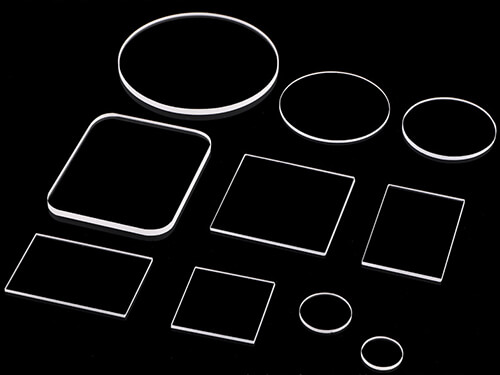
Types of Anti-fingerprint glass?
Anti-fingerprint glass, also known as oleophobic glass, is a type of glass that has been treated to resist fingerprint smudging. There are several types of anti-fingerprint glass available, including:
Chemical anti-fingerprint glass
This type of glass has a thin, invisible coating that repels oil and water, making it difficult for fingerprints to adhere to the surface.
Physical anti-fingerprint glass
This glass has a micro-etched surface that reduces the surface tension between the glass and oil. This makes it difficult for oil to adhere to the surface, resulting in fewer fingerprints.
Physical anti-fingerprint glass
This glass has a micro-etched surface that reduces the surface tension between the glass and oil. This makes it difficult for oil to adhere to the surface, resulting in fewer fingerprints.
Hybrid anti-fingerprint glass
This glass combines both chemical and physical treatments to provide superior anti-fingerprint properties.
Anti-fingerprint coatings
These coatings can be applied to the surface of regular glass to create an anti-fingerprint effect.
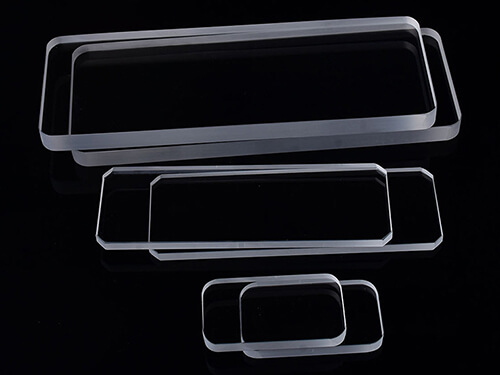
Applications of Anti-fingerprint glass cutting service?
Custom anti-fingerprint glass plate, panels, sight windows, and lens cutting services can be used in a variety of applications across different industries. Some of the most common applications include:
Electronic devices
Custom anti-fingerprint glass can be used for smartphones, tablets, laptops, and other electronic devices that have touch screens or display panels. The anti-fingerprint coating helps maintain the clarity and visibility of the screen, while also reducing the need for frequent cleaning.
Medical and laboratory equipment
Anti-fingerprint glass can be used for medical and laboratory equipment, such as microscopes, lab analyzers, and surgical instruments. The reduced number of fingerprints on the glass surface helps to maintain hygiene and prevent the spread of germs and bacteria.
Automotive industry
Custom anti-fingerprint glass can be used in the automotive industry for touch screens, control panels, and other displays. The anti-fingerprint coating helps to maintain visibility, even in bright sunlight or other challenging lighting conditions.
Retail industry
Anti-fingerprint glass can be used in the retail industry for display cases and shelving units. The reduced number of fingerprints on the glass surface helps to maintain the aesthetics of the display, while also making it easier to clean and maintain.
Architecture and construction
Anti-fingerprint glass can be used in the architecture and construction industry for windows, doors, and other glass surfaces. The anti-fingerprint coating helps to maintain the clarity and aesthetics of the glass, while also reducing the need for frequent cleaning.
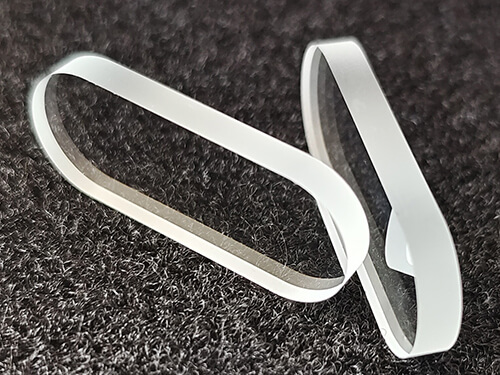
What advantages of custom Anti-fingerprint glass parts?
There are several advantages of using anti-fingerprint glass, including:
Improved visibility
Anti-fingerprint glass helps maintain a clear and clean surface by reducing the number of fingerprints on the glass. This results in improved visibility, especially for touch screens and display panels.
Increased durability
The anti-fingerprint coating or surface treatment can also increase the durability of the glass. This is because the coating protects the glass from scratches and other types of damage.
Aesthetically pleasing
Anti-fingerprint glass has a smooth and polished surface that enhances the overall appearance of the glass. This makes it an excellent choice for applications where aesthetics are important, such as smartphones, tablets, and other electronic devices.
Enhanced hygiene
Anti-fingerprint glass is also beneficial for applications where hygiene is critical, such as in healthcare facilities, laboratories, and food processing plants. The reduced number of fingerprints on the glass surface reduces the spread of germs and bacteria, leading to a cleaner and healthier environment.
Easy to clean
Anti-fingerprint glass is easier to clean and maintain than regular glass, as it does not require frequent wiping or cleaning. The oleophobic coating or surface treatment helps repel oil and water, making it easy to remove any smudges or stains.
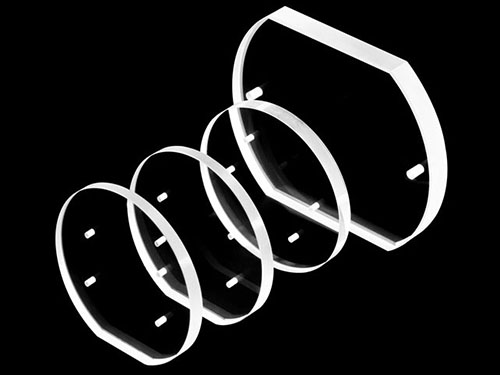
Disadvantages of Anti-fingerprint glass?
While there are several advantages to using anti-fingerprint glass, there are also some potential disadvantages that should be considered. These include:
Cost
Anti-fingerprint glass is generally more expensive than regular glass, as it requires additional processing and surface treatments. The cost of the glass may vary depending on the type of treatment, thickness, and size.
Durability
While the anti-fingerprint coating or treatment can increase the durability of the glass, it may not be as scratch-resistant as regular glass. This means that the glass may be more prone to scratches, especially if not handled carefully.
Performance
Some anti-fingerprint coatings or treatments may affect the performance of the glass. For example, they may reduce the brightness or contrast of a display panel or affect the sensitivity of a touch screen.
Limited availability
Custom anti-fingerprint glass may not be readily available in all sizes, thicknesses, or types of glass. This can make it more challenging to find the right solution for a specific application or project.
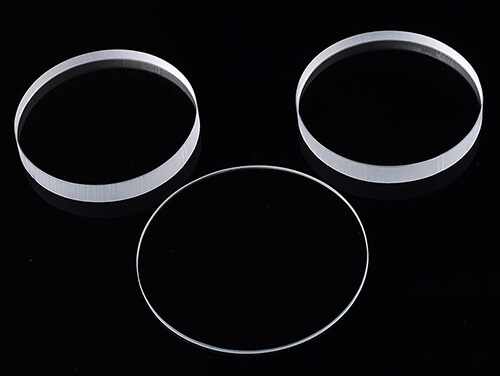
Get Your Custom Anti-fingerprint Glass Parts Into Production Today
Want to save time and money on your Anti-fingerprint glass parts project? Contact us now. Our factory provides high-quality precision custom Anti-fingerprint glass products at very competitive prices and fast production times. We support sample service.